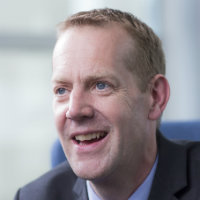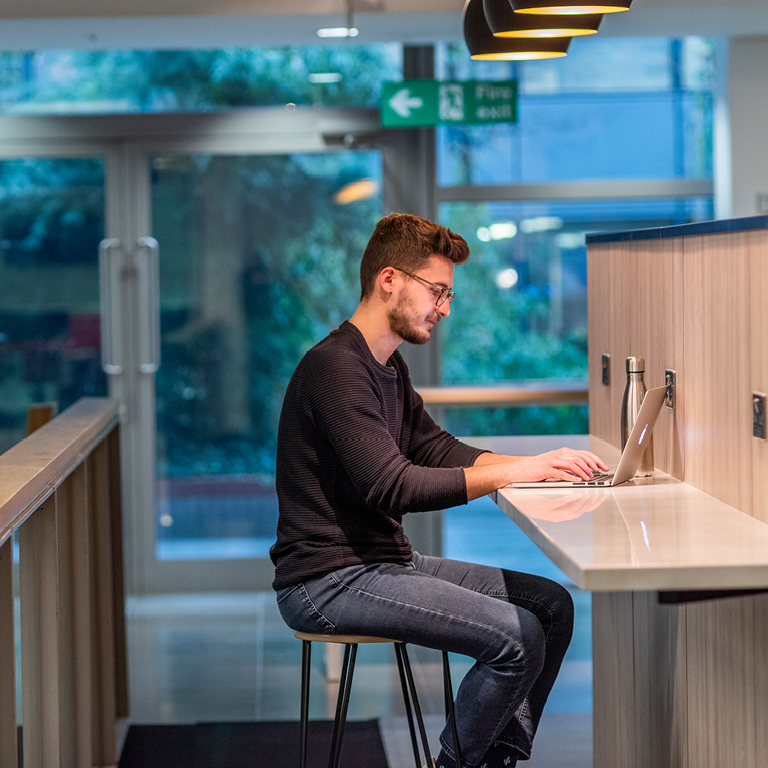Global Finance (online) MSc | PGDip; PGCert

Key information
Duration: 24 months; 18 months; 12 months
Attendance mode: Part-time; Online
Fees: £24,000 (more information)
Location: Online
Start of programme: May 2024
Application deadline: 19 April 2024
Entry year: Showing course information for 2024
Online and flexible for working professionals, combining core and cutting edge finance topics
Overview
Global Finance (online) MSc | PGDip; PGCert Who is it for?
Elevate your career from anywhere in the world with our fully online MSc Global Finance programme. The course is tailored for ambitious individuals, keen to advance their career in finance or pivot into the sector without pausing their careers.
The MSc Global Finance programme covers everything from fundamental financial principles to advanced investment strategies. It blends traditional topics with innovation, preparing you for a future where you can not only navigate the financial landscape but also help to shape it.
“The MSc in Global Finance is a unique course offering students world-class teaching and maximum flexibility so that we can keep focus on our careers too.”
- Velimir Milincic, MSc Global Finance graduate- Class of 2023/24
Delivered by a leading global business school, you can expect a high quality, engaging and interactive online learning experience. The teaching approach combines academic rigour with industry expertise to provide you with the most relevant and up-to-date knowledge, preparing you for real-world challenges.
Why choose this course?
- Study flexibly online without taking a career break at a triple accredited business school
- Develop new skills that you can immediately apply in your existing role or which will help you pivot into a new area
- Interact with world leading faculty who not only work at the frontier of academic research but also consult with financial institutions and government agencies
- Become part of the wider Bayes community while you study and join our extensive alumni network after you have completed your programme.
Course objectives
Over the course of this programme our students will be taught by celebrated finance experts as well as active researchers in finance, gaining a practical understanding of current issues and equipped with the analytical, numerical, and interpersonal skills needed to successfully take on the challenges of today's rapidly evolving world of global finance.
"This course has perfectly suited my needs by allowing me to complete an MSc at the times I wanted to and in my own home, sparing me the trouble of going back and forth to classrooms."
- Neetish Rampersad, MSc in Global Finance
Teaching staff
As a student on the MSc in Global Finance, you will be learning from a team of industry-leading experts and thought leaders, ably supported by our online tutors.
They will guide you through the content, exercises, discussions, weekly online webinars and assessments, ensuring that you never feel isolated as a learner.
Course Director:

Course content
Duration
The part time Msc course is 24 Months, PG Diploma is 18 months and PG Certificate is 12 months.
Induction
At the outset of your studies you will meet with the Bayes Digital Learning team and faculty who will introduce you to the key principles of successful online learning.
Course structure
Programme content is subject to change. We regularly review our module offering and amend to keep up to date and relevant.
MSc course modules
The first two modules of the course will build your foundational knowledge of finance, cash instruments, and how to analyse them. The following six will further your expertise through in-depth explorations of industry tools, techniques, and challenges. Finally, the last four modules will equip you with specialist knowledge of key industries within the financial sector and will set the course within a global context.
Modules
Foundations of Finance
You’ll be introduced to the concepts and tools that are essential for the study of modern finance theory.
You’ll learn about the time value of money and how to measure returns and risks for individual assets and portfolios of assets, and you will meet benchmark asset pricing models, such as the CAPM.
You will also be introduced to the idea of arbitrage in financial markets and how to use it to compute prices for new assets.
Bond and Equity Analysis
This module will provide you with the essential knowledge you’ll need in any area of finance in relation to the main cash instruments, and will begin under the assumption of minimal existing knowledge.
You’ll explore both the differences and similarities between fixed income and equity analysis, progressing quickly to equip you with the skills you need to effectively analyse these instruments.
The aim is to ensure you are able to understand how portfolio managers, corporate treasurers, investment bankers, financial analysts and traders use such securities in their various roles.
Investment Strategy
This module is designed to introduce you to some of the latest developments in investment strategy.
The majority of these new developments are grounded in academic research. This means that by completing this module, you’ll also become familiar with the underlying theories behind these new strategies.
Financial Statement Analysis
This module will introduce you to some of the core quantitative methods of analysing financial statements data in relation to supporting business decisions.
There is an emphasis on the analysis of financial information for assessing the fundamental value of traded securities in the global market, and for making investment decisions.
You’ll explore how the application of quantitative methods can improve the quality of business decisions – enabling decisions that are grounded by data analysis rather than gut feelings or preferences.
You’ll also learn to read between the lines of financial statements – how to identify and evaluate firms’ key value drivers, forecast financial information, design valuation techniques based on forecasts, issue an equity investment recommendation, and assess whether companies are appropriately priced by the market.
International Finance
This module will provide you with an in-depth understanding of the biggest financial market in the world – foreign exchange.
You’ll study the structure of different markets for foreign exchange, exploring how they operate and how the instruments traded in these markets are valued. You will learn the key economic drivers of exchange rates and how to take informed investment positions.
Derivatives and Risk Management
Derivative contracts are essential for the smooth operation of financial markets.
However, because they have the potential to increase the volatility of financial markets, it’s equally essential to have an in-depth understanding of how they work and how they’re priced and traded.
Through this module, you’ll develop in-depth knowledge of forwards, futures and swaps, and their application in risk management.
The module covers a full range of the most important options and futures contracts, including those traded on stock indices, commodities and credit instruments.
Alternative Investments
Following the collapse of the world’s equity markets between 2001 and 2003, many investors have been investing in, or are thinking of investing in, less traditional asset classes as an alternative to equities.
The integration of these alternative asset classes into traditional investor portfolios is still at an early stage, leaving investment managers with significant challenges as they look to satisfy investor demand for these alternatives. This module will provide you with the solid background in commodities, hedge funds, private equity and real estate that’s essential to success in today's investment management industry.
Corporate Finance
Through this module, you will acquire a thorough understanding of core theoretical principles, and become equipped with the most commonly used practical corporate finance tools that are relevant to key decisions around investments, financing and dividends.
While these decisions are made with the aim of maximising shareholder wealth, there are a number of important factors decision-makers need to take into consideration.
Designed and informed by academic research and case-studies this module will provide you with an in-depth understanding of these issues.
International Banking
This module will give you an insight into the major features of the banking business and an understanding of the different types of banks and banking activities.
You’ll examine the changing characteristics of the banking industry and the main activities banks are involved in, and see how these different activities fit within a bank’s overall portfolio.
You’ll also explore how different banks are pursuing different models (universal banking vs. specialised banking).
In particular, you’ll examine the asset structure and revenue-earning features of major commercial and investment banks. You’ll also gain an understanding of their cost and return features, and of recent developments in the industry.
Asset Management
This module will provide you with a fundamental understanding of the structure and functioning of capital markets, the principles of investment decisions under risk, and the optimal allocation among asset classes.
You will explore specific fund management issues related to applied asset pricing, as well as active and passive management, tactical asset allocation, investment style, the impact of transaction costs, portfolio performance measurement, and behavioural finance.
The Insurance Industry
Insurance has grown in importance to become a central theme in modern finance and economics, providing not only practical examples to illustrate new theories, but also inspiring new ideas of relevance for the general economy.
Today, higher-order risk attitudes play a central role in understanding how decisions are made by consumers and managers. This module will provide you with a thorough understanding of insurance activities, including the integration of risk and insurance theory and practice into the mainstream economic theory.
You will examine optimal decision-making within an insurance context. In particular, you will explore optimal insurance contract design under information asymmetry and moral hazard, and contemporary developments such as the economic analysis of insurance fraud.
Global Real Estate
This module will equip you with the knowledge you need about the most important aspects of real estate as an investment asset.
If you’re looking to work in general business and finance, this module will give you the basis you need to understand the real estate issues you’re likely to encounter.
If you want to specialise in real estate as an investor, fund manager or lender, this module will serve as the foundation for further development.
Assessment methods
Term dates
January 2024 entry term dates
| Study Session: 08 January 2024 – 25 February 2024 | Foundations of Finance |
| Study Session: 26 February 2024 – 14 April 2024 (*29th March & 1 April Bank Holiday) | Bonds |
| Study Session: 29 April 2024 – 16 June 2024 (*06 & 27 May 2024 Bank Holiday) | International |
| Study Session: 17 June 2024 – 04 August 2024 | Derivatives |
| Study Session: 09 September 2024 – 27 October 2024 | Alternative |
| Study Session: 28 October 2024 – 15 December 2024 | Corporate |
| Study Session: 06 January 2025 – 23 February 2025 | Investment Strategy |
| Study Session: 24 February 2025 – 13 April 2025 | Financial Statement Analysis |
| Study Session: 28th April 2025 – 15 June 2025 (05 May 2025 Bank Holiday) | Insurance Industry |
| Study Session: 16 June 2025 – 03 August 2025 | Global Real Estate |
| Study Session: 08 September 2025 – 26 October 2025 | International Banking |
| Study Session: 27 October 2025 – 14 December 2025 | Asset Management |
May 2024 entry term dates
|
Study Session: 29 April 2024 – 16 June 2024 (*06 & 27 May 2024 Bank Holiday) | Foundations of Finance |
| Study Session: 17 June 2024 – 04 August 2024 | Bond and Equity Analysis |
| Study Session: 09 September 2024 – 27 October 2024 | Alternative Investments |
| Study Session: 28 October 2024 – 15 December 2024 | Corporate Finance |
| Study Session: 06 January 2025 – 23 February 2025 | Investment Strategy |
| Study Session: 24 February 2025 – 13 April 2025 | Financial Statement Analysis |
|
Study Session: 29th April 2025 – 16 June 2025 (05 May 2025 Bank Holiday) | International Finance |
| Study Session: 17 June 2024 – 04 August 2024 | Derivatives |
| Study Session: 08 September 2025 – 26 October 2025 | International Banking |
| Study Session: 27 October 2025 – 14 December 2025 | Asset Management |
| Study Session: 12 January 2026 – 01 March 2026 | Insurance Industry |
Study Session: 02 March 2026 – 19 April 2026 | Global Real Estate |

Fees & funding
UK/Home/International fee
May 2025 entry
£24,000
MSc (split into four instalments across the two academic years)
PgDip (split into four instalments across the two academic years)
PgCert (split into two instalments across one academic year)
Tuition fees are subject to annual change.
Payment schedule
- (A deposit of £1,000 is payable upon acceptance of your offer. This will be deducted from the first payment of your fees.)
- First installment: Half first-year fees less deposit (payable during on-line registration which should be completed at least 5 days before the start of the induction period).
- Second installment: Half first-year fees (paid at the start of the second term)
- Third installment: Half second-year fees (payable during registration for second academic year)
- Fourth installment: Half second-year fees (payable at the start of the second term.
Tuition fee increases
Where applicable, tuition fees for Bayes' programmes will be subject to inflationary increases in each year of study. Our policy for these increases is set out in City, University of London's terms and conditions of study.
Scholarships & bursaries
Scholarships, sponsorships, loans and other funding could support your education at Bayes Business School.
Learn about the cost of living as a Bayes student in London.
Scholarships
We have a range of scholarships for Master's degrees at Bayes Business Scool. Most scholarship applications for 2024/25 year of entry will open in January 2024.
View our scholarships and fundingOther funding opportunities
Scholarships are very competitive, you may wish to look other options for funding, including the government PG Loan.
View other funding optionsSponsorship
Students on the course who are sponsored in full or in part by their employer will need to complete a sponsorship form as part of the application process.
View our sponsorship guidanceCareers
Whether your goal is to develop your career in finance, advance further within your current organisation or refresh your knowledge as a part of your continuous professional development earning our MSc in Global Finance can unlock a number of new opportunities for you professionally.
This part-time course will develop both your theoretical knowledge and develop your real-world financial skills. It also provides you with an opportunity to apply your learning to your workplace as you progress, ensuring that your studies can make a difference to your career right away.
Following graduation, you’ll be equipped to navigate the finance industry confidently whether this be in your career or in your own personal financial planning.
Of course, you’ll have our support throughout your studies and beyond. The Business School offers a variety of career services to help you make the most of your degree.
Our graduates
Nikita Kozachenko, oil and gas professional
Graduate Nikita was seeking to move from the energy sector into finance and chose our MSc to help him achieve this:
"With an MSc in Global Finance, I can get a position connected to the financial sector."
Valeria Radchenko, private banking professional
Valeria works in the Swiss finance sector and is applying her learnings from the MSc to improve her performance in her current role:
"Increasing your qualifications allows you to grow within your company."
Thomas Bratner, risk management professional
Having previously studied at master's level, Thomas was looking to deepen his knowledge of financial theories:
"Acquiring more knowledge makes you even more curious to learn."
Neetish Rampersand, financial regulation professional
Graduate Neetish had experience of finance products offered by the insurance market, but wanted to broaden his knowledge to other sectors:
"This course has boosted my confidence to deal with the evolving financial world."
Alumni stories
Entry requirements
- A UK upper second class degree or above, or the equivalent from an overseas institution in a relevant discipline
- Some study of quantitative topics at undergraduate level would be beneficial, for example from an economics, business, accounting, finance, engineering, mathematics, science or social science programme
- Work experience is not a requirement of this course but can be beneficial.
English language requirements
If you have been studying in the UK for the last three years it is unlikely that you will have to take an English language test.
If you have studied in the UK at degree level for less than three years (e.g. 3+1, 2+1, 2+2, etc.) you will be required to provide the results of an approved English language test and possibly resit the test to meet our academic entry requirements.
Full list of approved English language tests/qualifications and minimum requirements.
Apply
Please see our Application Guide for details of the documents you will need to supply as part of your application, and other useful information.
We cannot comment on individual eligibility before you apply. We can only make a decision on your application once it is fully complete, with all requested information received.
Frequently asked questionsApply for May 2024 entry
We only accept online applications. Apply by Friday 19 April 2024.
Terms and conditions
Students applying to study at Bayes Business School are subject to City, University of London's terms and conditions.
Student life
-
Have a question about student experience at Bayes?
Talk one-on-one with a student who is currently studying at Bayes.
Contact us
Speak to one of our staff from Master's programmes teams.
